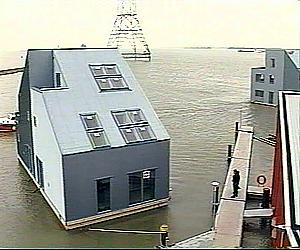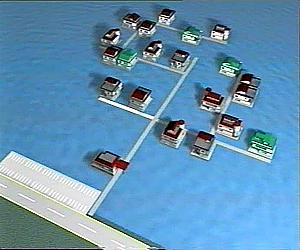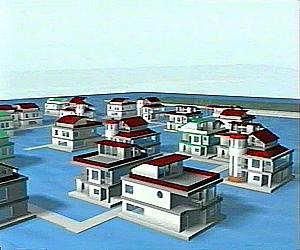With the sea
level rising as a result of global warming, the low-lying Netherlands is
fighting back for more space by building communities on water.
|
Ever thought of buying a house you could move with
you?
Recognising the growing scarcity of building ground in the Netherlands, a
Dutch construction company has started building houses on water. The
houses, made of wood and lightweight aluminium, are linked to each other
by walkways but can be detached from the surrounding neighbourhood and
individually moved by tugboats.

For centuries the Netherlands has fought against
invading water with land fills, dams and dykes. But the philosophy is
changing in the wake of global warming, blamed for the 20 cm-rise in
sea-level over the last century. Instead of driving out the water, the
Dutch is trying to live on it. And since we are getting more and more rain,
we are having more and more water in this country which is fifty percent
below the sea level as you know, and so we have developed this concept of
building villages on the water, Ooms Bouwmaatschappijs marketing director,
Gijsbert van der Woerdt told Reuters.
|

The company Ooms Bouwmaatschappij has built the
first eight of the planned 500 floating houses on the outskirts of
Amsterdam, capital of the worlds third most densely populated country. The
houses are designed to withstand gales and can be located up to 100 metres
from the shore.

 Spoken comments:
Spoken comments:
Gijsbert van der Woerdt
|
 |
 |
Interest in the novel mode of living, a natural progression from the
ubiquitous houseboats, has been keen. There are about 5,000 names on the
waiting list for the accomodation that sells for between $180,000 and
$500,000.
Doctor Dorien Vluchter and her husband Ari Mashiach took a day off to
visit the floating estate with their child.
"I have never thought about the possibility and it just appears to me
very interesting
|
that something is floating on the water. And the freedom,
maybe eventually we can take the house some place else. I think that is
more interesting than moving, now you just move your whole house",
Vluchter said. Her husband was more sceptical.
"I can imagine that the water is kind of calming, something very
quiet and nice to look at. On the other side, I think, well it is just
water, so I cannot open open the door and play in the garden with my
daughter, so I don't know", Mashiach said. |

 Spoken comments:
Spoken comments:
Dorien Vluchter |

 Spoken comments:
Spoken comments:
Ari Mashiach |

 Spoken comments: Frits Schoute
Spoken comments: Frits Schoute |
A Dutch
academic is taking this idea further and has been searching for ways to
colonise the sea. Frits Schoute, a former professor at Delft University,
is working on a stabilising platform that allows communities to live in
the middle of oceans, unaffected by waves.
"We are working on solutions for stabilising a platform and making
some kind of barrier around it, such that it is ultimately comfortable to
live on the sea", Schoute said.
Schoute expects people to start living and working on these full-scale
platforms by 2020, with floating cities being established in 2050. The
world will be a very different place. |
 |
 |
IJBURG, Netherlands, June 3
(Reuters) - Ever thought of buying a house you could move with you?
One Dutch construction company, recognising the the growing scarcity of
building ground in the Netherlands, has started to build houses on water.
Ooms Bouwmaatschappij has built the first eight of 500 planned floating
houses on the outskirts of Amsterdam - the capital of the world's third
most densely populated country.
the houses, which are designed to withstand gales, are built on floating
platforms, allowing owners with itchy feet to drift off to the sunset,
their homes in tow.
"We thought the market was right for it. Building ground is very
scarce in Holland and since 30 percent of it is water, it was very logical
to think of what other possibilities there are", Ooms
Bouwmaatschappij's marketing director, Gijsbert van der Woerdt told Reuters.
For centuries planning in this low-lying country has focused on separating
and maintaining the division between land and water. Precious land has
been reclaimed from the sea by building dams and heightening dikes.
But the tide of thinking has turned and in the quest to find fresh
building ground in the Netherlands, where two-thirds of the population
lives below sea-level, Dutch planners are looking to the country's most
abundant resource -- water.
"We've always fought the water but the philosophy has changed: it's
not our enemy, we're not going to fight it, we're going to use it,"
van der Woerdt said. |
|
WORRYING SIGNS OF GLOBAL WARMING
Alarm bells in the Netherlands started ringing in
the last decade which witnessed worrying signs of global warming -- rising
waters coupled with several unusually dry summers.
The sea level rose by 20 centimeters (eight inches) in the last century
and is expected to rise by three times that amount in the 21st century.
In a policy paper, the Transport, Public Works and Water Management
Ministry warned that a radical shake-up was needed in the way the
Netherlands has traditionally kept the sea at bay.
"We will have to relinquish space to water, and not win space from it,
in order to curb the growing risk of disaster due to flooding, limited
water-related problems and be able to store water for expected periods of
drought."
"Only by relinquishing space can we set things right and if this is
not done in a timely manner, water will sooner or later reclaim the space
in its own, perhaps dramatic, manner."
One Dutch academic thinks that floating houses will not just be a
fashionable lifestyle but a necessity in the coming years.
Frits Schoute, a former professor at Delft University, is working on a
stabilising platform that would permit communities to live in the middle
of oceans, unaffected by waves.
"My argument is this place is densely populated," said Schoute,
pointing to a map of the Netherlands. "Here the density is
zero," he said pointing to the sea beyond the Dutch coastline. "So
you would think there is pressure to colonise this space."
He expects colonisation by these floating cities to take place in the next
20 years.
"It's an easy place to get energy, to produce drinking water and find
new food sources -- al those factors combined will make it very attractive
for the world population and ultimately a necessity to live on the sea,"
he told Reuters. |
|
INTEREST KEEN IN FLOATING HOUSES
In the meantime interest in this novel mode of
living, a natural progression from the Netherlands' ubiquitous houseboats,
has been keen with about 5,000 names already on the waiting list.
"They are looking for a more natural surrounding than an apartment on
the ninth floor in the city," van der Woerdt said of potential floating house
buyers.
The houses, retailing between $180,000 and $500,000, will be located up to
100 metres (330 feet) away from the sea shore. Made of wood and
lightweight aluminium, they will be linked to each other by walkways.
They will be arranged initially in clusters but they will be able to be
detached from the surrounding neighbourhood and moved individually by
tugboat to new waters.
"What's interesting is you can move your house. It's nice because
it's free, it's not attached to to anything," said Dorien Vluchter,
family doctor and mother of two, inspecting the show houses.
However, her husband was less impressed.
"I can imagine that the water is kind of calming, something very
quiet and nice to look at. On the other side, I think, well it is just
water, so I cannot open the door and play in the garden with my daughter." |
|